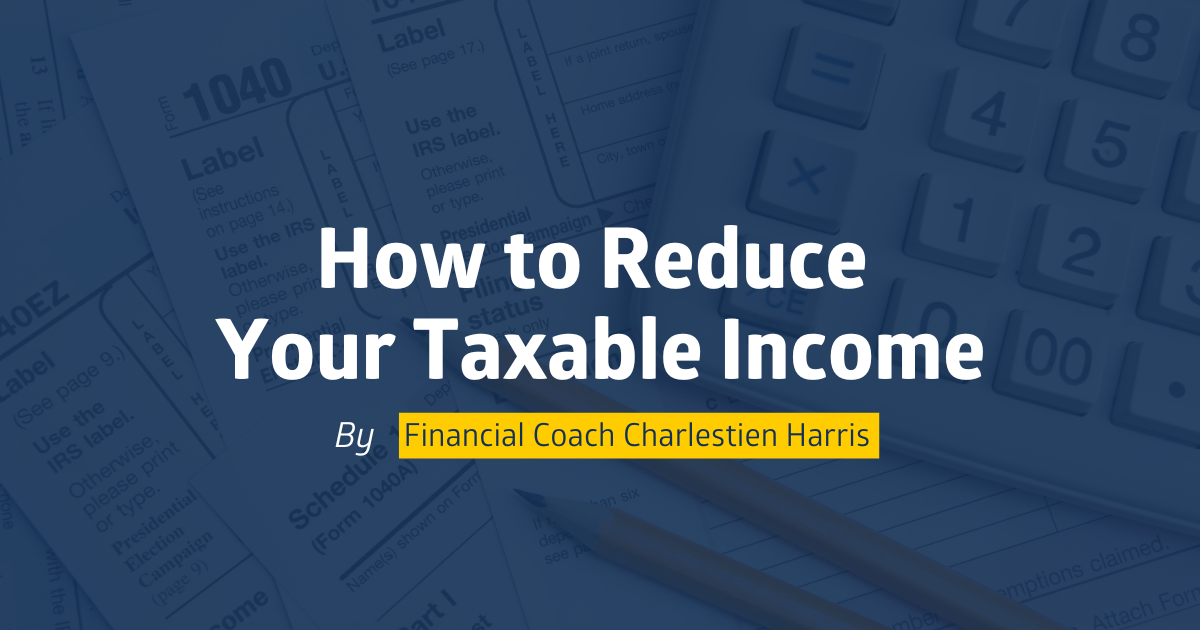By: Charlestien Harris
The 2023 tax season has come and gone, but the 2024 tax season is just around the corner! Taxes are a sure thing, and most of you want to know how you can reduce your tax bill in the coming year. Tax planning between now and the end of the year can have a significant impact on how much tax you have to pay next April.
There are a few methods that you can use to reduce your taxable income. These include contributing to an employee contribution plan, such as a 401(k), contributing to a health savings account (HSA) or a flexible spending account (FSA), and contributing to a traditional IRA or a Roth IRA. With a little careful planning, you can reduce your 2023 tax bill and quite possibly reduce your 2024 taxable income by exploring the three options listed below.
- Maximize your 401(k) contributions.
First, maxing out your 401(k) means that you contribute the maximum amount allowed by law in a given year, as specified by the established guidelines of the IRS 401(k) contribution limits. Second, it can also mean that you’re maxing out your contributions up to an employer’s percentage match, too. If you want to max out your 401(k) in 2023, you’ll need to contribute $22,500 annually. If you’re 50 or older, you can contribute an additional $7,500, for an annual total of $30,000. Starting in 2024, people who are 50 or older and make more than $145K will have to put the additional amount, the catch-up contribution, in a Roth account. You should check the IRS guidelines to make sure you are current with the new changes in the law for making contributions. - Contribute to an HSA or an FSA.
A health savings account is a tax-advantaged account that you can use to pay for qualified medical expenses that your high deductible health plan (HDHP) does not cover. One way to manage your health care expenses is to enroll in an HSA if you qualify. This acts like a savings account that lets you set aside money on a pre-tax basis to pay for qualified medical expenses. A flexible spending account is a dedicated savings account that’s designed to help you save money on anticipated health care costs. FSAs let employees and/or employers set aside money to pay for expenses such as out-of-pocket medical costs the worker will incur throughout the year. Because FSA contributions are deducted from an employee’s earnings, they aren’t subject to payroll or income taxes. - Contribute to a traditional or Roth IRA account.
An IRA is an account set up at a financial institution that allows an individual to save for retirement with tax-free growth or on a tax-deferred basis. A traditional IRA (Individual Retirement Account) is an account to which you can contribute pre-tax or after-tax dollars. With a Traditional IRA, your money can grow tax-deferred, but you will pay income tax on your withdrawals, and you must start taking distributions after age 73. Unlike with a Roth IRA, there are no income limitations to opening a Traditional IRA. It may be a good option for those who expect to be in the same or lower tax bracket in the future. A Roth IRA is an Individual Retirement Account that allows you to contribute after-tax dollars. While there are no current-year tax benefits, your contributions and earnings can grow tax-free, and you can withdraw them tax-free and penalty-free after age 59½ and once the account has been open for five years.
Tax planning can be defined as the arrangement of a person’s financial situation to maximize tax breaks and minimize tax liabilities in a legal and efficient manner. Tax planning is a viable strategy that can work for you if you do your research and implement a tax plan that will save you money and reduce your tax bill.
And in case you didn’t already know or need a little reminder, Southern Bancorp leads a VITA (or Volunteer Income Tax Assistance) program every year through which we provide free tax preparation services for our communities, whether you’re a customer or not. So if you need a little help during tax season or if you just want to save on preparation costs, simply stop by a participating branch near you and we’ll take care of the rest!
For more information on this and other financial topics, you can call me at 662-624-5776 or email me at Charlestien.Harris@banksouthern.com.
Until next week – stay financially fit!
